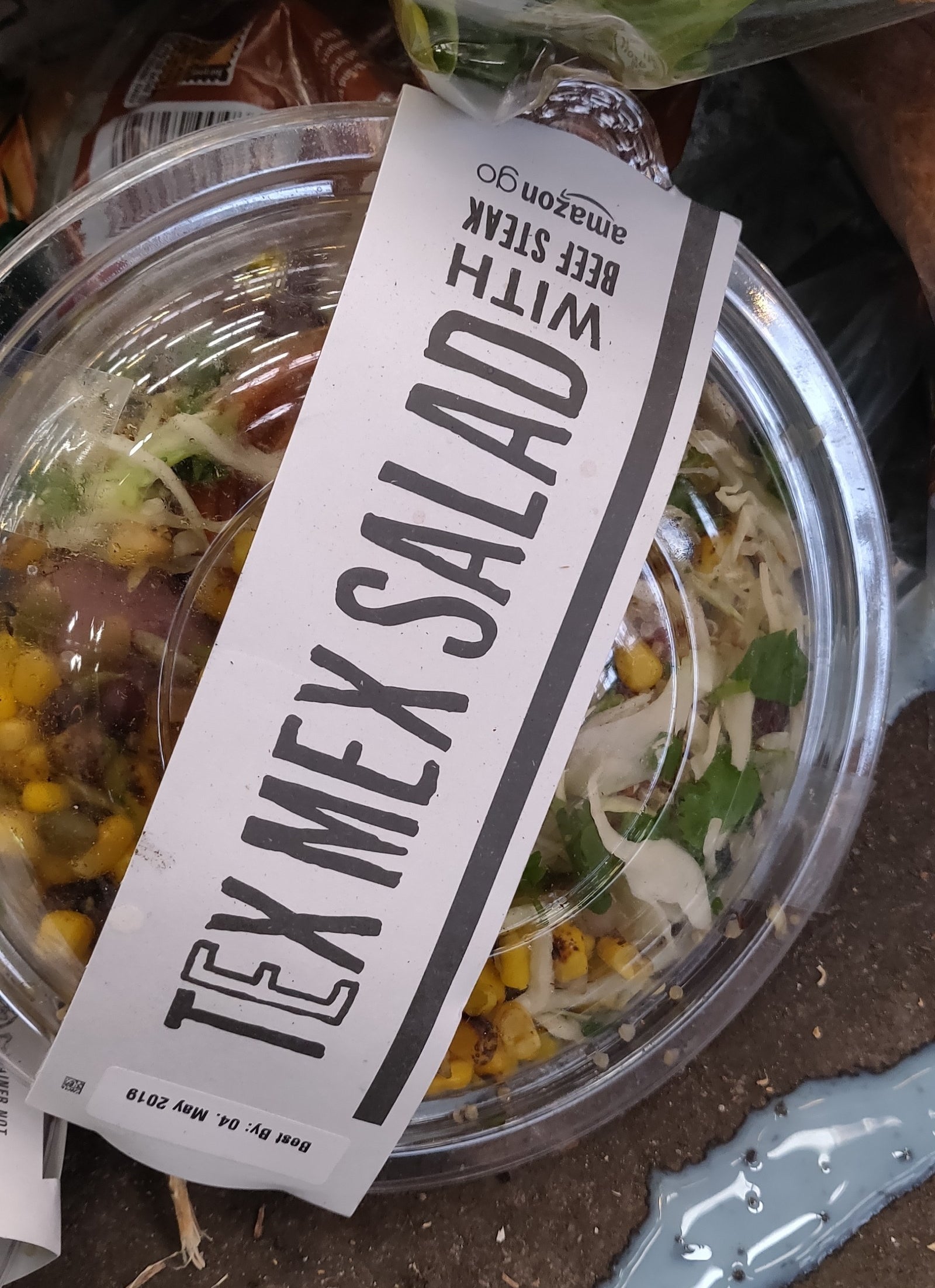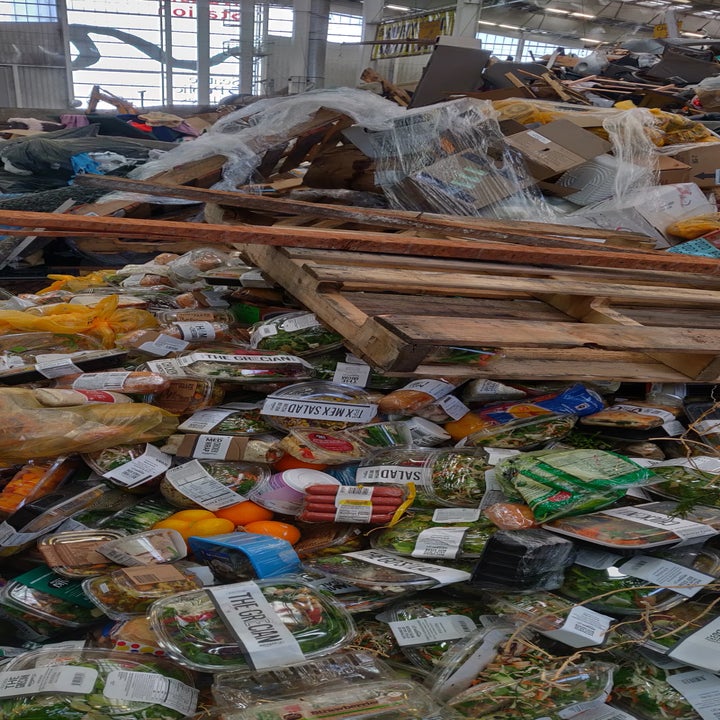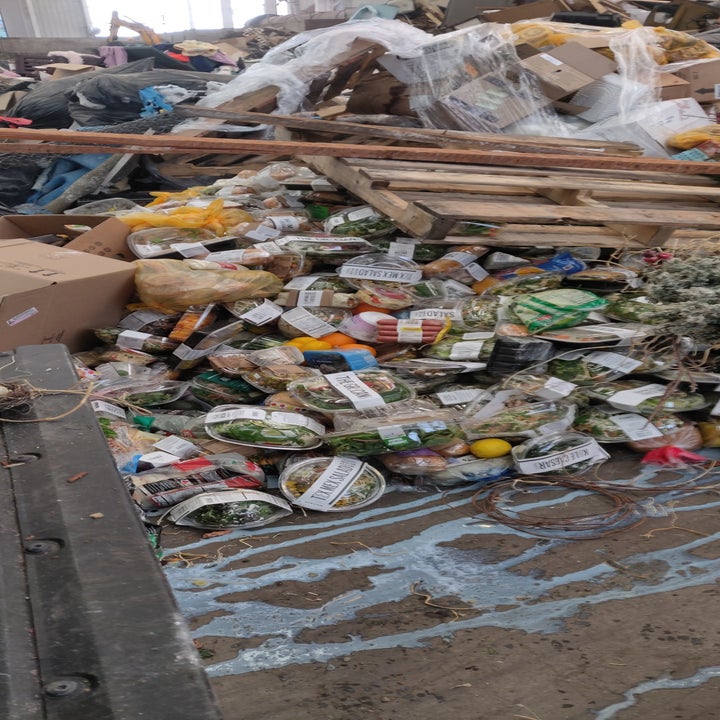A Huge Pile Of Unsold Food From Amazon Go Was Found In A Seattle Landfill
Seattle resident Nathan Gregg was at a waste facility, about 15 minutes south of the city's downtown area, dumping construction materials at around 3:30 p.m. Thursday when he discovered a nearly 6-foot-high pile of prepared meals still in their Amazon Go packaging. Amazon Go is the e-commerce giant’s cashierless convenience store concept.
Courtesy of Nathan Gregg
Longtime Seattle resident Nathan Gregg discovered the pile of unsold food with Amazon Go packaging at a waste facility 15 minutes south of the city's downtown area.
Photos provided by Gregg showed various wraps, salads, and sandwiches encased in their original sealed plastic containers alongside packaged hot dogs, mushrooms, loose bell peppers, and other grocery items. The discarded food was found at South Transfer Station. There are four Amazon Go stores located in Seattle, and eight other locations across San Francisco, Chicago, and New York.
After Gregg reported the incident, Seattle Public Utilities told him that the Amazon Go waste is being investigated, and the items would be removed from the landfill.
The incident captures the prolific amount of plastic-wrapped food waste the self-checkout stores create.

Courtesy of Nathan Gregg
Seattle resident Nathan Gregg provided this image, showing a close-up of the Amazon Go packaging found in the landfill and a recent expiration date.
In an email to BuzzFeed News, an Amazon spokesperson said the company’s policy is to compost food that can’t be donated and to recycle the packaging. The spokesperson suggested other parties may have been responsible for the irresponsible disposal: “Amazon Go’s policy is to donate unsold food that is still in good condition to local non-profits to help support the community. ... In certain circumstances, our community partners may also be discarding food but we can’t comment on the details of their practices.”
Gregg said while he didn’t see any visible mold on the products, he wouldn’t expect the food to be donated as most were past their expiration dates by a few days. But he felt the packaging’s contents should at the very least be sent to a facility that could separate waste for composting.
“In Seattle, we have a big emphasis on composting. Why doesn’t Amazon have a program where they’re not just throwing away the expired food in plastic in a landfill?” Gregg said.
In 2015, Seattle banned food waste in garbage, directing residents to compost it instead. Residents and businesses that do not comply receive up to two warning notices before receiving a $50 fine on their waste bill per collection. The citywide ordinance, under municipal code 21.36.082, states that all commercial establishments that generate food waste must “subscribe to a composting service, process their food waste onsite, or self-haul their food waste for processing.”
Sabrina Register, a spokesperson for the utilities commission, said that the South Transfer Station where the Amazon Go waste was found is not set up to separate “recoverable materials” — like food — from waste.
“While it is disappointing to see such pre-packaged food items disposed of this way, SPU is actively working to promote the rescue of such food,” Register said. She added that the commission works to ensure that edible food is donated.
Amazon Go is billed as a “grab-and-go” convenience store on its website. Its shelves are lined with ready-to-eat options, and the products’ plastic packaging makes it easy for people to purchase individual meals or snacks quickly. The packaging also ensures that the food is stackable and stays fresh. Individually wrapped items, like cupcakes, are common in the stores. In this grab-and-go model, however, when unsold products are discarded, it’s not just the food that goes to the landfill but all the single-use packaging used to display each serving as well.
Consumers are paying more attention to their waste creation now, and local governments are banning single-use products like straws and plastic bags.
“Single-use packaging provides a momentary convenience, but can remain a problem for decades or more,” Eric Goldstein, senior attorney of the Natural Resources Defense Council, told BuzzFeed News. Petroleum-based plastic, he said, takes up space in landfills for over a lifetime, and eventually breaks down into smaller pieces of microplastics that pollute waterways.
Amazon Go isn't the only convenience store where packaging waste is a concern. Many other grocers, including the Amazon-owned Whole Foods, also have a large selection of prepared foods. Trader Joe's sells so much packaged and prepared food that it's become a famous destination for dumpster diving.
Still, Goldstein added, “Because of its size and position in the US economy, Amazon has a special responsibility to address sustainability questions in a thoughtful way. They ought to be a leader on these issues.”
With the rise of convenience stores offering prepared and packaged food, Amazon’s footprint is set to expand rapidly. Convenience stores already experienced record in-store sales in 2018, according to the National Association of Convenience Stores, and Amazon may be opening up to 3,000 new Go stores by 2021.
A Huge Pile Of Unsold Food From Amazon Go Was Found In A Seattle Landfill
![A Huge Pile Of Unsold Food From Amazon Go Was Found In A Seattle Landfill]() Reviewed by Your Destination
on
May 12, 2019
Rating:
Reviewed by Your Destination
on
May 12, 2019
Rating:






